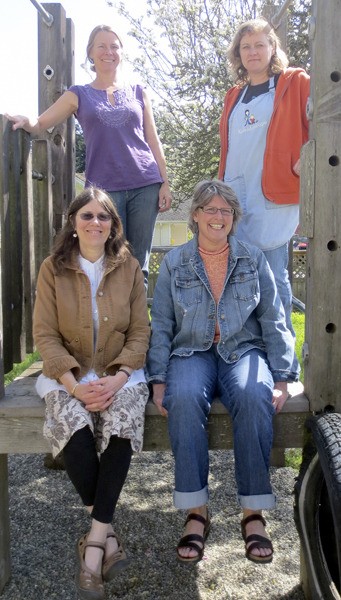When President Barack Obama made Early Childhood Education a priority earlier this year, you may have heard a collective whoop echo along North Beach Road, artery to four Orcas early learning centers, Children’s House, Salmonberry, Montessori and Kaleidoscope.
“My first thought was, ‘finally!’” says Teresa Chocano, Montessori executive director. “But then I thought, wait. Where’s the money?”
Fortunately, Washington state is one step ahead in prioritizing early education, having recently won a $60 million grant for Early Achievers, a quality rating and improvement project that rolls out to San Juan County Pre-K schools in July. All four Orcas schools want to participate in the program, which is expected to take up to 12 months to complete.
Without endorsing any particular curriculum, the Washington Department of Early Learning developed Early Achievers as a system to define and measure overall center quality. So while licensed centers have long been required to meet safety, environment and teaching standards, says Amber Paulsen, executive director of Kaleidoscope, “Early Achievers raises the bar for quality expectations and defines the benchmarks by which our centers will be measured.”
Research has shown that high quality early learning education has long-term economic and social benefits for children.
“But we have struggled for years trying to define and rate ‘high quality education,’ explains Sage MacLeod, director of San Juan County Early Childhood Education and Assistance Program. “With Early Achievers in our Orcas centers, we can measure and be certain that our schools are providing the highest quality learning opportunities for our children, leading them to kindergarten readiness and life long success.”
Coaches, specialists and mentors will observe how well teachers and schools meet six integral elements of quality care-giving: family partnering; everyday interactions; strong curriculums; regular child assessments; individualized teaching; and professional development and training. They’ll make recommendations for center enhancements and improvements and at the conclusion of the program provide a comprehensive assessment of each school and some financial incentives.
Children’s House Executive Director, Susan Anderson, acknowledges the four centers have unique educational philosophies but says they’re united in their desire to provide quality early education for all island children.
“Early Achievers gives us an opportunity to tap state funds for materials, professional expertise and additional staff education – all this in keeping with our educational philosophies,” says Anderson.
The schools are seeking additional support for the program through a combination of grants, professional scholarships and fundraising. They estimate the program’s combined cost at more than $120,000, with Early Achievers underwriting about half.
“Enrollment is voluntary but not without an investment from us,” says Eliza Morris, administrative director of Salmonberry. “We’ve sought additional financial support to ensure we have the best chance at meeting and exceeding the benchmarks.”
In conjunction with the program, the four centers will host an annual event to familiarize Pre-K families with the benefits of early learning, give centers an opportunity to introduce their program philosophies and educate families on the quality standards they can expect from all four island centers.



